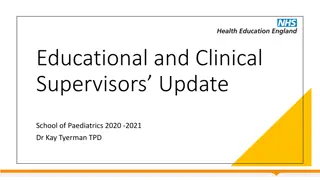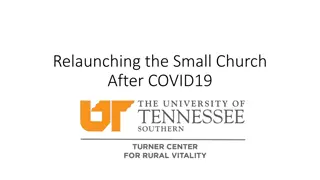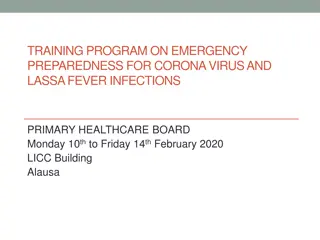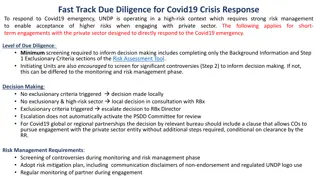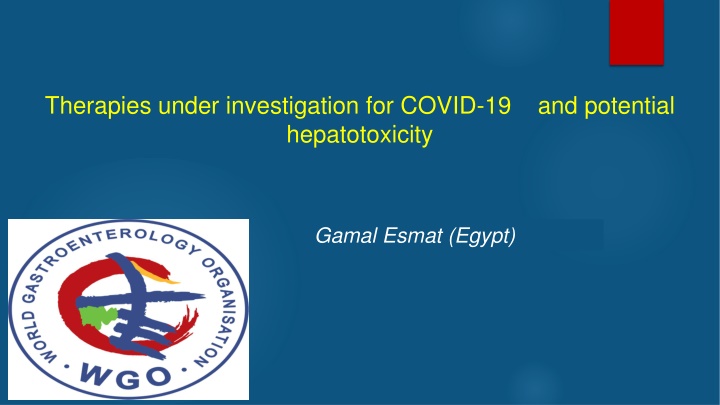
Therapies Under Investigation for COVID-19 and Potential Hepatotoxicity
Explore the therapies under investigation for COVID-19 with a focus on potential hepatotoxicity risks, treatment considerations for patients with chronic liver disease, and insights into specific drugs like Remdesivir, Chloroquine/Hydroxychloroquine, Lopinavir/Ritonavir, and Tocilizumab. Understand the implications of liver function on drug toxicity and the need for close monitoring in patients with liver cirrhosis or after liver transplantation.
Download Presentation

Please find below an Image/Link to download the presentation.
The content on the website is provided AS IS for your information and personal use only. It may not be sold, licensed, or shared on other websites without obtaining consent from the author. If you encounter any issues during the download, it is possible that the publisher has removed the file from their server.
You are allowed to download the files provided on this website for personal or commercial use, subject to the condition that they are used lawfully. All files are the property of their respective owners.
The content on the website is provided AS IS for your information and personal use only. It may not be sold, licensed, or shared on other websites without obtaining consent from the author.
E N D
Presentation Transcript
Therapies under investigation for COVID-19 and potential hepatotoxicity Gamal Esmat (Egypt)
Treatment considerations for COVID-19 in patients with chronic liver disease or after liver transplantation Currently no drugs approved for CoVID-19, several tested, many under investigation. Regarding patients with chronic liver disease: impaired liver function is particular high risk for drug toxicity, i.e. in patients with Child-Pugh B/C cirrhosis1. Consider drug-interactions in liver transplant patients with certain immunosuppressive therapies. Drug levels of calcineurin inhibitors (cyclosporine or tacrolimus), and mTOR inhibitors (sirolimus or everolimus) will have to be closely monitored. Boettler, T., JHEP Reports, 2020
Remdesivir NUC, that acts as viral RNA polymerase inhibitor in vitro1. Case reports2and Initial analysis of large RCT suggest shortened recovery time of severe COVID-19 patients. Recent double-blind placebo controlled randomized study in 1063 patients confirmed findings of case reports3 No experience in patients with liver cirrhosis; based on experience with NUCs in chronic hepatitis B and C, might be safer drug than other drug classes. Liver toxicity with ALT elevation is a possible adverse event with no relevant drug-interactions expected4. 1. Wang, M., Cell research, 2020; 2. Holshue, NEJM 2020; 3. Beigel JH et al, NEJM 2020; 4. Available from: http://www.covid19-druginteractions.org/
Chloroquine/ hydroxychloroquine Antimalarial drug, currently under evaluation. Significantly associated with viral load reduction, reinforced by azithromycin in COVID-19 patients in initial reports. These initial reports not confirmed in a large observational study4 Exclude G6PD deficiency before application Monitor drug-interactions with immunosuppressive medications that required close monitoring of drug level for cyclosporine, tacrolimus, sirolimus, everolimus Risk of severe QT prolongation induced by combination of the two drugs should be considered5. 4. Geleris J et al, NEJM 2020; 5.Abdel Galil SM, Lupus 2015
Lopinavir/ritonavir Approved protease inhibitors (PIs) as second line HIV treatment Many centres discontinued use, no proven efficacy in vivo in severe COVID-19. Drug-interactions with immunosuppressive drugs studied. Drug level monitoring for calcineurin inhibitors (cyclosporin, tacrolimus) while mTOR inhibitors (sirolimus, everolimus) should not be co-administered. Patients with decompensated cirrhosis should not be treated , based on experience with PIs in HCV. Risk of lopinavir-associated hepatotoxicity in patients with very advanced liver disease is low. Cao, B., NEJM 2020; Casado, J.L., HIV clinical trials, 2011.
Tocilizumab Humanized mono-clonal Ab against interleukin-6 receptor t Works by damping cytokine release syndrome observed in COVID-19. ALT elevations are frequent but clinically apparent liver injury with jaundice rare. HBV reactivation may occur Should not be used in patients with decompensated cirrhosis. Genovese, M.C., Arthritis & Rheumatology, 2017; Chen, L.F., . Int J Rheum Diseases, 2017
Convalescent plasma Potential therapeutic effect and low risk in the treatment of severe COVID-19 patients. No experience as yet with convalescent plasma therapy in patients with chronic liver disease. Duan, K., PNAS 2020.
Sofosbuvir and Ribavirin Sofosbuvir ribavirin in COVID-19 infection suggested. Sofosbuvir, a nucleotide analogue, originally approved for treatment of HCV infection. In case of COVID-19, in vitro data show binding to SARS-CoV-2 RdRp. Considered safe based on experience in patients with chronic hepatitis including patients with decompensated cirrhosis. Ribavirin should be cautiously used as it may cause severe haemolytic anaemia. Elfiky, A.A,. Life Sciences 2020.
Favipiravir Guanine analogue, RdRp inhibitor, approved for influenza (Japan) Better treatment out-comes in COVID-19 patients in terms of their disease progression and viral clearance. ALT and AST elevation possible side effect with no data in cirrhosis available. Cai, Q., Engineering (Beijing). 2020

